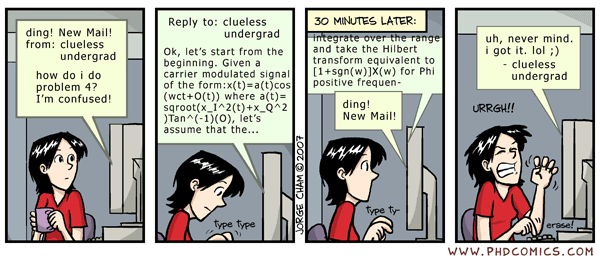One of the more interesting things the Physics & Astronomy Department at GMU does is get students involved with the hiring of faculty. Last Spring and again this month, I have been on the student committee responsible for interviewing the short list of candidates for new teaching positions. We go to seminars the candidates are giving at GMU, then participate in an hour-long, student-only interview session with the candidate. After seeing all the candidates, the student committee (about 4-6 of us) sends in our collective commentary on each one, along with our hiring priority preference (including any opinion against hiring). The hiring committee takes the recommendations of the student committee very seriously - the last few times they have given the first offer to the students' first choice (and they never offer a job to someone the students say not to hire, even if the other candidates all turn down offers).
Last year's candidates were not too exciting for me - largely based on fields in physics (including neuroscience) where I had little interest and less knowledge (or maybe vice-versa). This year, however, the candidates are all in the field of planetary science, which is awesome.
Our first candidate presented some current research based on magnetic fields (called crustal fields) on the surface of Mars. This is new research, as the mission responsible for gathering the data is still orbiting the planet. He was very excited about his topic and a good speaker. Even better, based on our interview of him later on, he seems like he would be an interesting and engaging professor for freshman and sophomore students, especially those not already in a science field (hopefully getting them to choose a science major).
The second candidate was a letdown from the first. His research, on the possibility of earth-like planets in stable, habitable obits around binary stars, was fairly interesting (and the models of how planets may be forming in those systems pretty cool), but he definitely lacked the excitement value of the first one. His interview did not improve matters. We rate him a distant last place.
Today's candidate discussed the current mission around Titan (and various other Saturnian moons) and the fact that, instead of finding 300m of methane seas around the whole planet, they found sand dunes! There seems to be a lot of methane missing and they are trying to figure out where it went (including the most obvious conclusion - the models are broken). He was an engaging speaker (after a shaky start) and very personable. I had lunch with him and several other faculty members and my opinion only improved. We feel he would be a decent teacher (he does not have the experience the first one does) and an incredible research advisor. I'd say he is either tied for first or a very close second place.
The final candidate will do his schtick next week (Monday or Tuesday - I'd better check). I almost hope he's not quite as good as the two we already like - it isn't too useful to send the hiring committee a recommendation to hire 3 of the 4 people they sent us (when just getting 1 of them will be tough).
If I can’t dance, it’s not my revolution
-
I see tankies keep trying to argue with people about “Actually Existing
Socialist” states like USSR and China and try to argue with me or others
about how ...



